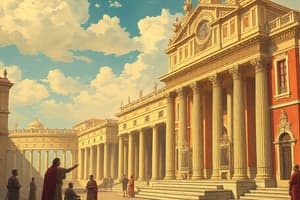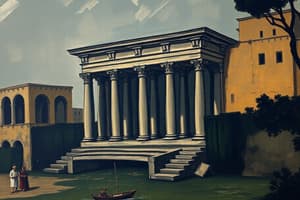Podcast
Questions and Answers
What was the Assembly of Centuries?
What was the Assembly of Centuries?
The Centuriate Assembly of the Roman Republic was one of the three voting assemblies, originally dividing Roman citizens into groups of one hundred men by classes.
What was the Senate in the Roman Republic?
What was the Senate in the Roman Republic?
The Senate was a political institution whose members were appointed by the consuls, not elected.
What were the Laws of the Twelve Tables?
What were the Laws of the Twelve Tables?
The earliest attempt by the Romans to create a code of law, binding on both patricians and plebeians.
What does 'veto' mean?
What does 'veto' mean?
What were consuls in the Roman Republic?
What were consuls in the Roman Republic?
What are legions?
What are legions?
What are latifundia?
What are latifundia?
What is a tribune?
What is a tribune?
What does 'triumvirate' mean?
What does 'triumvirate' mean?
What was Pax Romana?
What was Pax Romana?
What is the forum?
What is the forum?
What is Judaism?
What is Judaism?
What is Christianity?
What is Christianity?
What is the Torah?
What is the Torah?
What is a rabbi?
What is a rabbi?
What is a martyr?
What is a martyr?
What are aqueducts?
What are aqueducts?
What is a dictator?
What is a dictator?
Who is the pope?
Who is the pope?
What is a bishop?
What is a bishop?
What does inflation mean?
What does inflation mean?
What is the Messiah in Judaism?
What is the Messiah in Judaism?
What is a sect?
What is a sect?
What is crucifixion?
What is crucifixion?
What does 'Etruscan' refer to?
What does 'Etruscan' refer to?
What were the Tarquins?
What were the Tarquins?
Who were the patricians?
Who were the patricians?
Who were the plebeians?
Who were the plebeians?
Who were the Huns?
Who were the Huns?
What does the term 'Visigoths' refer to?
What does the term 'Visigoths' refer to?
Who was Spartacus?
Who was Spartacus?
What is Julius Caesar known for?
What is Julius Caesar known for?
Who was Marcus Crassus?
Who was Marcus Crassus?
Who was Pompey?
Who was Pompey?
Who was Cleopatra VII?
Who was Cleopatra VII?
Who was Marc Antony?
Who was Marc Antony?
Who was Octavian?
Who was Octavian?
Who was Jesus?
Who was Jesus?
Who was Peter?
Who was Peter?
Who was Paul?
Who was Paul?
Who was Pontius Pilate?
Who was Pontius Pilate?
Who was Abraham?
Who was Abraham?
Who was Moses?
Who was Moses?
Who was Hannibal?
Who was Hannibal?
Who were Romulus and Remus?
Who were Romulus and Remus?
Who was Constantine?
Who was Constantine?
What were the Barbarian invasions?
What were the Barbarian invasions?
What did Diocletian do during his reign?
What did Diocletian do during his reign?
What is Carthage?
What is Carthage?
What happened to Pompeii?
What happened to Pompeii?
What was Gaul?
What was Gaul?
What was Circus Maximus?
What was Circus Maximus?
What are parishes?
What are parishes?
What is a diocese?
What is a diocese?
Who are patriarchs?
Who are patriarchs?
Why did Pax Romana end?
Why did Pax Romana end?
How did church leaders take power?
How did church leaders take power?
Who were the vandals?
Who were the vandals?
Who became the new leader of Italy after the fall of Rome?
Who became the new leader of Italy after the fall of Rome?
Some lasting legacies of the Roman Empire include __________.
Some lasting legacies of the Roman Empire include __________.
Flashcards are hidden until you start studying
Study Notes
Political Institutions and Assemblies
- Assembly of Centuries: A key voting assembly in the Roman Republic, originally organized Roman citizens into groups of one hundred by classes.
- Senate: An appointed body consisting of former magistrates, it played a crucial role in Roman governance without being elected.
- Consuls: The highest elected officials of the Roman Republic, two consuls served one-year terms and were part of the cursus honorum.
- Tribunes: Officials chosen by plebeians to represent and protect their interests.
- Dictator: A ruler with total power, often obtained through force.
- Triumvirates: Political alliances in ancient Rome, notably the First (Caesar, Pompey, Crassus) and Second (Antony, Lepidus, Octavian) Triumvirates.
Legal and Social Structures
- The Twelve Tables: The first Roman code of law established around 450 B.C., creating a foundation for legal rights among patricians and plebeians.
- Veto: The constitutional right to reject decisions made by legislative bodies, instrumental in balancing power.
- Patricians vs. Plebeians: Patricians were aristocrats, while plebeians were commoners, highlighting the class divisions in Roman society.
Military and Economic Aspects
- Legions: The largest military units in the Roman army, essential for territorial expansion and defense.
- Latifundia: Large estates typically worked by slaves, reflecting economic structures reliant on agriculture.
- Barbarian Invasions: Caused by the search for better resources, these invasions led to significant changes in the Roman Empire.
Religion and Cultural Influences
- Judaism and Christianity: Both religions played pivotal roles in the cultural landscape of the ancient world, with figures such as Jesus, Moses, and early church leaders like Paul and Peter shaping their foundations.
- Messiah: In Jewish tradition, the expected deliverer; this concept influenced Christian beliefs.
Notable Historical Figures
- Julius Caesar: A general and key figure in the transition from the Roman Republic to the Empire; renowned for his military prowess and political acumen.
- Augustus (Octavian): The first emperor of Rome, who established the principate after defeating Antony and Cleopatra.
- Hannibal: A Carthaginian commander known for his tactical genius during the Second Punic War against Rome.
- Constantine: Declared Christianity the official religion of the Roman Empire and established Constantinople as the capital.
Significant Events and Trends
- Pax Romana: A period of relative peace and economic prosperity (27 B.C. to A.D. 180) marked by stability in governance.
- End of Pax Romana: Factors included political instability, economic troubles, and external pressures from Germanic tribes.
- Fall of Rome: Culminated in the 5th century with Germanic invasions, leading to the fragmentation of power.
Lasting Legacies
- Achievements of the Roman Empire: Innovations such as aqueducts, the Julian calendar, bound books, concrete monuments, the Roman numeral system, roads, and the spread of Christianity and Latin have had long-lasting impacts on civilization.
Unique Aspects
- Aqueducts: Engineering marvels that transported water, demonstrating Roman advancements in infrastructure.
- Circus Maximus: A venue for chariot races and public entertainment, symbolizing the social and cultural life of ancient Rome.
- Etruscan Civilization: A powerful ancient culture that influenced early Roman society and politics.
Studying That Suits You
Use AI to generate personalized quizzes and flashcards to suit your learning preferences.




